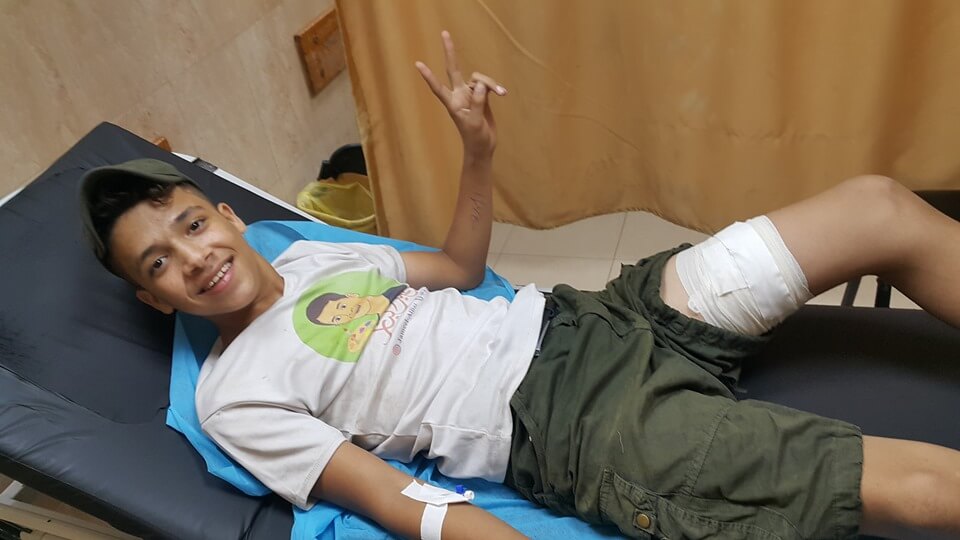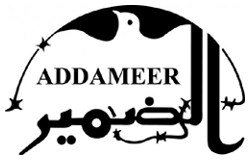
Jamil holding a portrait of his friend, Tamer Abu al-Khair. (Photo: Mohammed Asad)
“Posters of the world’s cinema heroes are pasted on the walls outside Gaza, but the martyrs of the March of Return have become the heroes of our real life cinema here in Gaza,” explains 16-year-old Jamil al-Baz, who has drawn the portraits of dozens of the protesters who has been killed in the 66 weeks of the protest in Gaza so far.
His brother Muntaser, 18, was shot in the head during a protest near Bureij in central Gaza by an Israeli sniper, and died of his wounds in a hospital on October 23. His portrait is now in the young artist’s collection.
“I think I have lost the second part of my life by losing him and he is now no more than an engraved picture here, and in my heart.” Jamil told Mondoweiss.

Jamil remembers every single detail of when his brother and he were protesting separately that afternoon in Bureij. He heard an ambulance officer sending a radio signals to the hospital via a walkie-talkie saying: “Man down – shot in the head, its Jamil al-Baz.” But I poked the officer, it’s me I am alive! He asked to join the medics to go to the hospital to prove that he was uninjured. But then the shock when he saw Muntaser was in a chaotic scene, with emergency personnel desperate to save his life, many hands were pushing on his chest.
“I do not know how I felt, it was mixture of dozens of incomprehensible feelings, the chanting of protesters was echoing in my mind even in the middle of the night,” Jamil said as he added the finishing touches on a portrait.

Abdul-Rahman Aqel, 18, was the third member of the ‘tripartite friends’, along with the al-Baz brothers. On May 25th, Aqel was also shot dead by live ammunition fired by the Israeli army at a Deir al-Balah protest, some 30 to 60 meters away from the main fence.
More than 350 Palestinians and one Israeli have been killed since the protests began in March 2018.

The story of Aqel’s death has also dominated Jamil’s mind. When they were preparing to join the protest in May, they bought ice-lemon from an ice-cream van. As they moved towards the protest their friend Tamer Abu al-Khair suddenly said seriously that one of them would be leaving the protest dead on a gurney. So, they decided to spend the whole time 300 meters away from the fence. The fatal bullet penetrated Aqel’s chest just as they decided to go home before the sunset.
Aqel has been added to Jamil’s art collection. His death left a deep hurt in the young boy’s heart. “It was the first time I witnessed an unforgettable death in person,” Jamil says.

Ten months later, Jamil was also forced to memorize Tamer’s facial features as he prepared to draw another of his now lost forever close friends. “That hero was lifted on our shoulders. We were in his home few hours before the protest began. Tamer’s mother urged us to take care by not moving close to the fence, but his fate was faster than her cautions.”

The young artist who dreams of buying a Faber Castell Polychromos Color Pencil set and a wooden table desk, is enrolled in daily summer classes in the al-Shuada’a, center, the Camp’s largest mosque. Three more of his friends who have been killed in the protest also used to attend ping-pong lessons in the mosque; Hasan Nawfal, 17, Muhannad Abu Tahoun, 18, and Mujahed Aqel. All of them, and another four elders, have joined his collection of drawings. Some were delivered to their mothers and wives, he said.
Jamil’s interest in portraits was not motivated solely by the March of Return. It started when he was 11, when his family’s two-story concrete house in al-Nusairat refugee camp was shaking during Israel’s 51-day war on the Gaza Strip dubbed “Operation Protective Edge.”
“Despite my young age at that war, I felt I was a weak-willed boy who must be a man. I thought that neighbors who were fleeing their homes in the camp’s alleys should be captured in some way. Then I headed to my bedroom during the war to draw the terrified mothers’ and children’s faces and pasting them up outside our home, like the cinema actors I have seen in the American and Egyptian movies.”

Update: On July 19, 2019, as this story was being published, Jamil al-Baz was lightly wounded at the weekly Great March of Return protest in Deir al-Balah:





